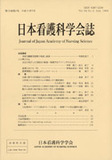Japanese
English
- 販売していません
- Abstract 文献概要
- 参考文献 Reference
- サイト内被引用 Cited by
要旨
出産後における女性の心の健康尺度(MHPW)を開発し,関連要因との関係を明らかにすることを目的とした.量的研究方法を用い,開発した尺度の妥当性信頼性を検討した後,その得点との関連因子との関係を分析した.
研究対象者は,産後2週間から5ケ月までの,生児を得,研究への協力が得られた女性301名であった.MHPWの内的一貫性と併存妥当性が認められ,妊娠の計画性を除く,出産後の生活上のストレス,出産経験の肯定的認知,子どもの扱いにくさ,精神科疾患の既往,ネガティブライフイベントにおいてMHPW得点との間に相関関係が認められた.分散分析では出産準備教室への参加の有無と分娩様式を除く,初産と経産との間に統計的有意差があった.
結果から,出産後の生活上のストレスを軽減し,出産経験に対する肯定的な認知を強化する介入によって,出産後の女性の心の健康を促進できる可能性が示唆された.
Abstract
The purposes of this study were to develop a mental health scale for use in assessing mental health in postnatal women (MHPW), and to determine the relation between the score and related factors. A quantitative approach was used.
The study population comprised 301 women who delivered live-born babies, and who consented to cooperate in the study at 2 weeks to 5 months after delivery. The originally developed MHPW was confirmed as to internal consistency and concurrence.Without the factors of unwanted pregnancy, there were correlations between MHPW score and daily life stress after birth, positive perception of birth experience, difficulty in caring for the baby, past history of psychiatric disease, and negative life events. ANOVA showed significant difference in MHPW scores between primipara and multipara, except vaginal delivery and cesarean birth, whether participate to mother's class.
These results suggest that nursing care to reinforce positive perceptions about the birth experience and reduce life stress may promote women's mental health.
Copyright © 1999, Japan Academy of Nursing Science. All rights reserved.


